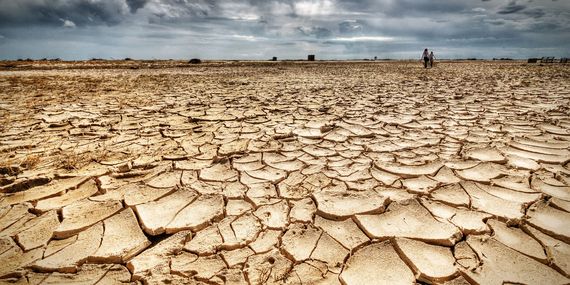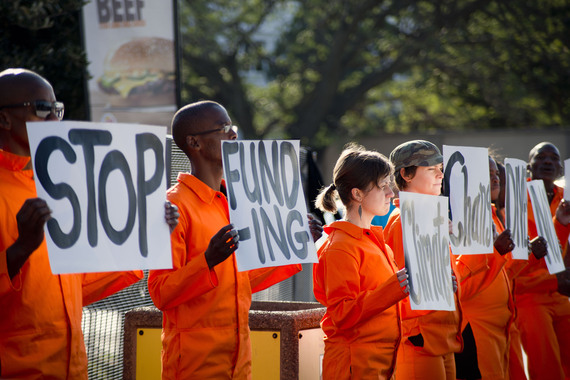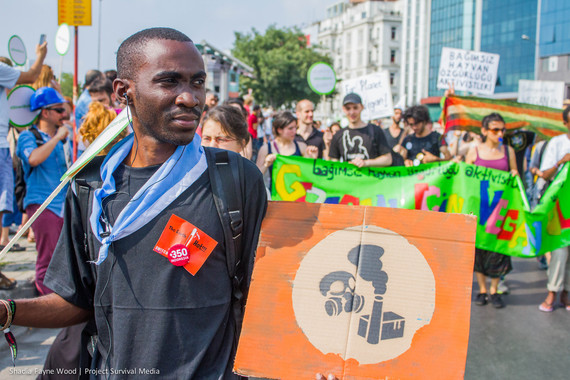As the Marrakesh Climate Talks begin in earnest this week, local and regional communities are keenly aware of what is at stake after record breaking temperatures this summer. This translates into dangerously hot weather for the region of this year's climate talks. According to Climate Signals on July 21, Mitribah, Kuwait reported a maximum temperature of 54.0°C, the hottest temperature ever recorded in the Eastern Hemisphere and the second hottest globally. This was followed on July 22nd, when Basrah, Iraq reached 53.4°C.
The journal Science, stated last week that even if warming is constrained to 2°C above preindustrial times--which is the central goal of the Paris Agreement--the Mediterranean region would see changes never experienced during recorded history. Morocco could see increased temperatures and drought that would drive the southern deserts further north, displacing forests. Deserts would expand in the Middle East, pushing temperate forests higher into the mountains. Average temperatures in the region have already risen by 1.3°C since the late 19th century, well above the world average of 0.85°C, according to the study.
This research follows a study earlier this year from NASA that found that the recent drought that began in 1998 in the eastern Mediterranean Levant region, which comprises Cyprus, Jordan, Lebanon, Palestine, Syria, and Turkey, is likely the worst drought of the past nine centuries.
Although political progress has been made, with the Paris Agreement being ratified last week, this is not enough. The fossil fuel industry's recklessness continues to push the planet to the brink of catastrophe.
Quite simply time is not on our side. The accumulated impact of decades of carbon dioxide, released from burning of fossil fuels, is rapidly taking its toll on the planet. Temperatures have broken records in 2016 and are shocking scientists who believe that CO2 levels have now permanently passed the threshold of 400 parts per million (PPM), compared to 280 ppm in pre-industrial times, much too high to avoid dangerous impacts.
To try and stem this worrying trend towards accelerated warming is to immediately stop building new fossil fuel projects, and fully invest in 100% renewable energy for all so we can phase out those already in use. Both pre and post- 2020 ambitions must be sharply increased. Investors and governments have a responsibility to both divest from climate destruction and accelerate the just transition to a 100% renewable energy economy.
Fossil fuel subsidies
But how can we have faith in our governments to take this action when they continue to hand nearly hundreds of billions of dollars in government subsidies to the coal, gas, and oil industries? Ending these subsidies would be a giant step towards solving the climate crisis saving gigatonnes of carbon dioxide emissions, and helping make clean energy cheaper than fossil fuels.
In June more than 200 civil society organizations called on the G20 to phase out fossil fuel subsidies by 2020. But despite a commitment by G7 nations in May to end government financial support for oil, gas and coal by 2025, the wider G20 group was unable to agree on a deadline.
Subsidies from G20 governments to fossil fuel production alone - excluding subsidies to consumers - averaged $444 billion annually in 2013 and 2014, according to a report by Oil Change International and the London-based Overseas Development Institute (ODI).
Corporate lobby
If the situation with on-going financial subsidies isn't worrying enough, the UN climate talks also allows the fossil fuel industry free reign in its halls. The fossil fuel industry is doing everything it can to protect its profits, including making sure its interests are represented in the policymaking arena.
Last week, a new infographic by Corporate Accountability International revealed the true extent of the fossil fuel industry's access to, and influence over the talks. This is unacceptable. The fossil fuel industry has to be kicked out of the climate talks so world leaders can take action for our future and do justice for the people already feeling its impacts.
The climate movement will also continue to hold the oil, gas and coal industry accountable in groundbreaking legal action. In September 2015, the Philippine Reconstruction Movement and Greenpeace Southeast Asia filed a petition with the Philippines' Commission on Human Rights on behalf of 13 organisations and 20 individuals, requesting that the Commission investigate the role of carbon majors in causing climate change and ocean acidification. The Commission agreed to take up the case and recently served a petition on 46 fossil fuel companies including BP, Exxon, Shell and Peabody.
This is not the only legal case against the dirty energy giants. In the US, state governments are investigating whether fossil fuel companies - including ExxonMobil - may have violated laws pertaining to fraud and deception, by actively undermining the science of climate change, even while they have known about the dangers since as early as 1977.
One thing is clear, over the next two weeks and beyond, we need to hold the fossil fuel industry accountable for the harm it continues to cause. Our demand to world leaders meeting in Marrakech is this: stop new fossil fuel projects from being built. Redirect finance for a just transition to 100% renewable energy that can empower people across the globe.
This post is part of a series produced by The Huffington Post, in conjunction with the U.N.'s 22nd Conference of the Parties (COP22) in Morocco (Nov. 7-18), aka the climate-change conference. The series will put a spotlight on climate-change issues and the conference itself. To view the entire series, visit here.



